Geometry | Chapter 5 | 8th Maths - Medians of a Triangle | 8th Maths : Chapter 5 : Geometry
Chapter: 8th Maths : Chapter 5 : Geometry
Medians of a Triangle
Medians
of a Triangle
A median
of a triangle is a line segment from a vertex to the midpoint of the side opposite
that vertex.
In the figure ![]() is a median of ∆ABC.
is a median of ∆ABC.

Are there
any more medians for ∆ABC ? Yes, since there are three vertices in a triangle, one
can identify three medians in a triangle.
Example 5.16
In the figure,
ABC is a triangle and AM is one of its medians. If BM = 3.5 cm, find the length of the side BC.
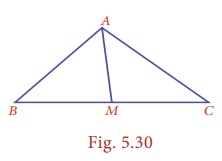
Solution:
AM is median ⇒ M is the midpoint of BC.
Given that, BM = 3.5 cm, hence BC = twice the length BM = 2 × 3.5 cm = 7 cm.
Activity
1. Consider a paper cut-out of a triangle. (Let us have an acute-angled
triangle, to start with). Name it, say ABC.
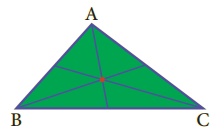
2. Fold the paper along the line that passes through the point A
and meets the line BC such that point B falls on C. Make a crease and unfold the
sheet.
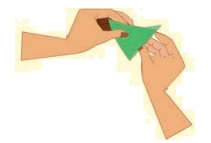
3. Mark the mid point M of BC.
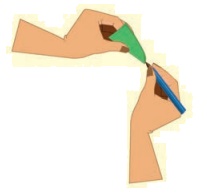
4. You can now draw the median AM, if you want to see it clearly. (Or you can leave it as a fold).
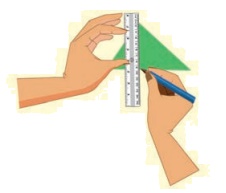
5. In the same way, fold and draw the other two medians.
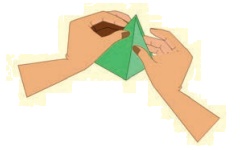
6. Do the medians pass through the same point?
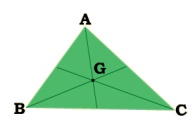
Now you can repeat this activity for an obtuse - angled triangle
and a right triangle.
What is the conclusion? We see that,
The three medians of any
triangle are concurrent.
1. Centroid
The point
of concurrence of the three medians in a triangle is called its Centroid, denoted by the letter G.Interestingly, it happens to be the centre
of mass of the triangle. One can easily verify this fact. Take a stiff
cut out of triangle of paper. It can
be balanced horizontally at this point on a finger tip or a pencil tip.
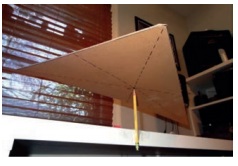
Should you
fold all the three medians to find the centroid? Now you can explore among yourself
the following questions:
(i) How can
you find the centroid of a triangle?
(ii) Is the centroid equidistant from the vertices?
(iii) Is the centroid of a triangle always in its interior?
(iv) Is there anything special about the medians of
an (a) Isosceles triangle? (b) Equilateral triangle?
Properties of the centroid
of a triangle
The location
of the centroid of a triangle exhibits some nice properties.
• It is always
located inside the triangle.
• We have
already seen that it serves as the Centre
of gravity for any triangular lamina.
• Observe
the figure given. The lines drawn from each vertex to G form the three triangles
∆ABG, ∆BCG, and ∆CAG.
Surprisingly,
the areas of these triangles are equal.
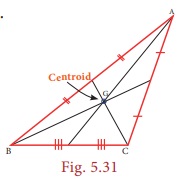
That is, the medians of a triangle divide
it into three smaller triangles of equal area!
The centroid of a triangle
splits each of the medians in two segments, he one closer to the vertex being twice
as long as the other one.
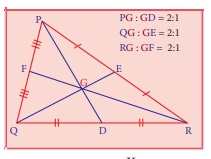
This means the centroid divides each median in a ratio of 2:1. (For
example, GD is ⅓ of PD).
(Try to verify this by
paper folding).
Example 5.17
In the figure
G is the centroid of the triangle XYZ.
(i) If GL
= 2.5 cm, find the length XL.
(ii) If YM
= 9.3 cm, find the length GM.
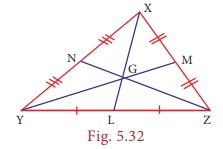
Solution:
(i) Since
G is the centroid, XG : GL = 2 : 1 which gives XG : 2.5 = 2 : 1.
Therefore,
we get 1 × (XG) = 2 × (2.5)
⇒ XG
= 5 cm.
Hence, length
XL = XG + GL = 5 + 2.5 = 7.5 cm.

(ii) If YG
is of 2 parts then GM will be 1 part. (Why?)
This means YM has 3 parts.
3 parts is
9.3 cm long. So GM (made of 1 part) must
be 9.3 ÷ 3 = 3.1 cm.
Example 5.18
ABC is a
triangle and G is its centroid. If AD=12 cm,
BC=8 cm and BE=9 cm, find the perimeter of ∆BDG .
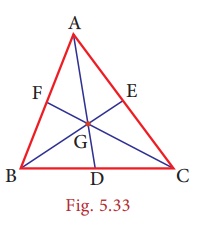
Solution:
ABC is a
triangle and G is its centroid. If,
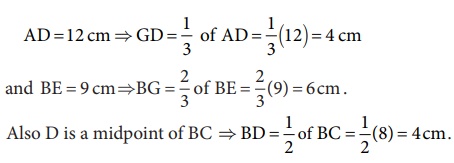
The perimeter of ∆BDG = BD+GD+BG = 4+4+6 = 14 cm
Solution 2:
ABC is a triangle and G is its centroid. If,
AD = 12 cm
⇒
GD = 1/3 of AD = 1/3(12) = 4 cm and BE
= 9 cm
⇒ BG
= 2/3 of BE = 2/3 (9) = 6cm .
Also D is
a midpoint of BC
⇒
BD = 1/2 of BC = 1/2 (8) = 4cm.
The perimeter
of ∆BDG = BD+GD+BG = 4+4+6 = 14 cm
Related Topics